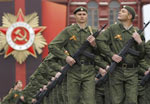Politics
8 beheaded bodies found in northern Mexican state
Updated: 2011-05-13 09:03
(Agencies)
MEXICO CITY - The bodies of eight decapitated men were dumped Thursday along roads in Durango, a drug-gang-plagued northern Mexican state already grappling with the horror of discovering mass graves where 196 corpses have been unearthed so far.
Six of the naked bodies were found along a highway leading out of the state capital of Durango city, their heads lying nearby, according to a statement from the state attorney general's office.
The two other bodies were found in another city street. One was identified as the remains of Gerardo Galindo Meza, the deputy director of a city prison who had been kidnapped Monday. Galindo's head was on a different street corner, accompanied by a threatening message signed by a drug gang, the statement said.
It was the second time this week that beheaded bodies have been found in Durango state. Eleven corpses were found Monday, including six left across from a middle school in the capital. Investigators have announced no arrests or possible motives.
Durango is one of Mexico's most dangerous states, a drug cartel cradle where some of the most notorious kingpins are believed to be hiding. Homicides have more than doubled in the vast, mountainous state over the last two years amid a turf war between the Sinaloa and Zetas gangs.
Soldiers continue digging at mass graves discovered April 11 in five places around Durango city. The bodies of seven men and one woman were recovered Wednesday, bringing the toll to 196, the Durango Public Safety Department said in a statement.
Investigators say some of the victims have been dead as long as four years, while others were killed as recently as three months ago.
Dozens of relatives of people who have disappeared in Durango have come to determine if their loved ones were buried in the graves.
Durango's secretary for government, Hector Vela, told local reporters that many of the victims are likely gang members killed by rivals. But some may be missing police officers, and others may be victims of kidnapping and extortion attempts.
Only one body has so far been identified: a 31-year-old man who had been reported missing several months ago. His brother claimed the body.
Such mass graves have become a hallmark of Mexico's relentless drug conflict, which has claimed at least 35,000 lives nationwide since President Felipe Calderon sent thousands of troops and federal police into the strongholds of drug cartels in late 2006. The crackdown has led to major arrests, but violence has surged as splintered cartels fight increasingly gruesome turf battles.
Last month, security forces unearthed 183 bodies from 40 pits in the northeastern state of Tamaulipas, many of them believed to be people kidnapped from passenger buses by the Zetas drug gang, which has been trying to forcibly recruit Mexicans and foreign migrants.
Just six of the 183 bodies have been identified so far, five Mexicans and one Guatemalan.
President Felipe Calderon's security spokesman, Alejandro Poire, said Tuesday that the government has deployed 500 soldiers in Tamaulipas to help curtail drug violence in an operation that will last a year.
Troops arrived Wednesday night at the state's capital, Ciudad Victoria. There is already a strong federal police presensce in Tamaulipas, where two formerly allied drug cartels- the Zetas and the Gulf cartel - are fighting.
The mayor of Ciudad Victoria, Miguel Gonzalez Salum, said he had taken guns away from local police officers.
A state official said the reason why they took away their arms was because 80 percent of the officers in two Tamaulipas cities failed background and security tests. The official spoke on condition of anonymity because he was not authorized to speak about the case.
In the northern state of Sinaloa, which borders Durango, gunmen wielding Kalashnikov rifles attacked a car along a rural road outside the town of Choix on Wednesday, killing five people and injuring one, according to an official from the state attorney general's office, who spoke on condition of anonymity because of security concerns.
The victims included a 19-year-old woman, her husband and their 9-month old daughter.
Police had no suspects and the motive was unclear.
In a separate attack, gunmen traveling in seven cars ambushed police officers leaving their base Wednesday night in the Sinaloa city of Los Mochis, the official said.
One officer was killed and two were injured in a gunbattle. Three cars stained with blood were abandoned at the scene, an indication that the attackers may have fled with injured or slain companions, the officials said.
The officers belong to a special state police unit, known as the Elite Group, created by Sinaloa Gov. Mario Lopez Valdez after he took office in January. The unit of 140 officers underwent training in investigative techniques at a federal police academy and has been deployed to hot spots around the state. The government hopes to have 850 officers join the force before the end of the year.
Asked about the ambush, Sinaloa Secretary for Government Gerardo Vargas said it may have been revenge for recent arrests by the elite unit.
Shortly after the ambush, banners were hung from bridges in Los Mochis and the state capital of Culiacan, accusing the Elite Group of being allied with Joaquin "El Chapo" Guzman, the fugitive leader of the Sinaloa cartel. There was no way to verify who put up the banners.
Lopez Valdez has come under fire after he rehired a former state police chief who had been charged several years ago with protecting the Sinaloa cartel. The government, which denies any ties to drug gangs, has defended the appointment of Jesus Antonio Aguilar Iniguez as a special police adviser, saying he was exonerated of the charges and has needed expertise.
E-paper

War of the roses
European Chinese rose growers are beating their Chinese rivals at their own game
Preview of the coming issue
High-tech park gets big boost
At the source
Specials

New wave
Coastal city banks on marine sector to ride next stage of economic development

Drunk driving
Drunk drivers face a detention for one to six months and a revokation of their drivers' license.

V-Day parade
A military parade marking the 66th anniversary of the Soviet victory over Nazi.
